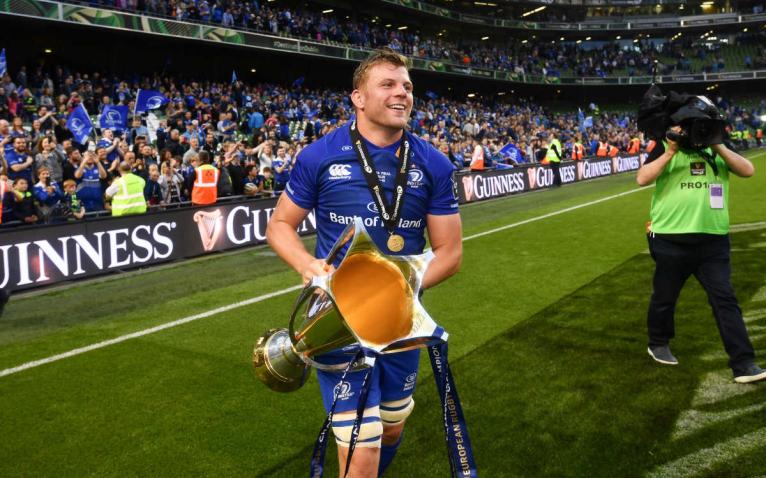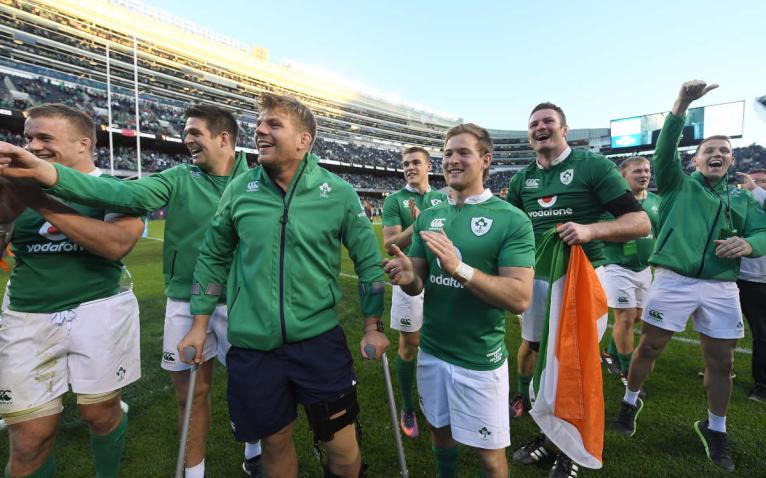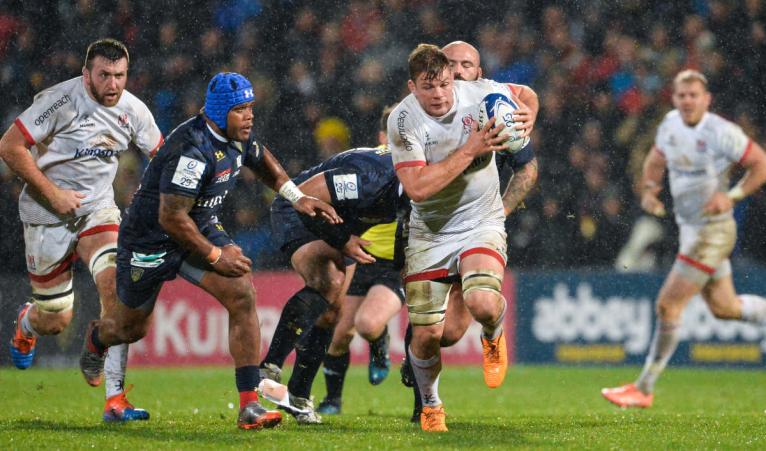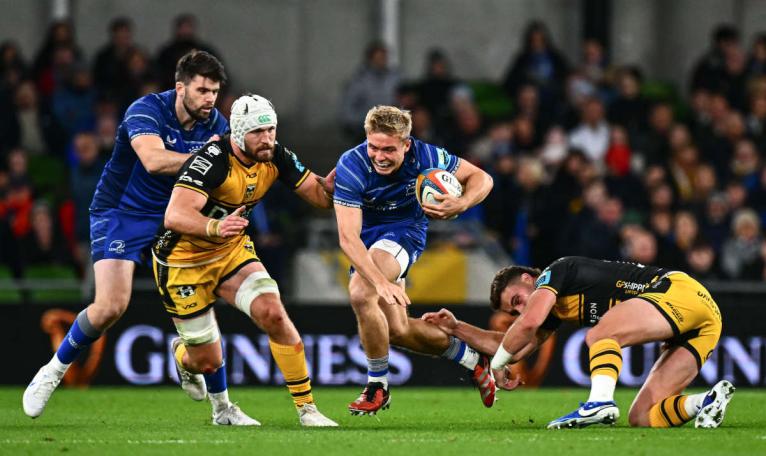It has been just over a year since Jordi Murphy went from rugby player to rugby agent. He now has that perspective of distance to really take stock of a 12-year playing career, and all the highs, lows and rehabs that came with it.
“When I look back at my debut,” he reflects, “it kind of came out of nowhere. I was in the academy, chipping away, and playing some good stuff for Lansdowne. But I got my chance off the back of guys coming back from the (2011) World Cup with injuries, and I played five or six senior games in that first season. I played okay; didn’t tear up any trees but must have done enough to impress Joe (Schmidt) and the coaches. The next season, opportunities came pretty thick and fast. I had my Leinster debut in October 2011 and was playing for Ireland in the Six Nations by February 2014. I know that’s a two and a half years period, but it certainly didn’t feel like that. It felt like two weeks!
“I was on top of the world, at that stage, and playing my best stuff. I went to the 2015 World Cup, had some decent moments and came back from that feeling good about where my game was at. Then I started having some niggles. I’d been in about six or seven Ireland squads and playing consistently for Leinster then, all of a sudden, it felt, I’m out in the cold. That sort of stuff wasn’t always easy but it taught me not to take stuff for granted. Part of the experience is so all-consuming and exciting, at times, but maybe I did get a little ahead of myself.

“So, in my job now, it’s making sure guys are aware and trying not to lapse into that way. Enjoy it as much as you can, and make the most of it, but realise that you’re in this high-octane environment that is seriously competitive. If you drop your output by even 5%, there’s someone else there that is ready to go.”
‘A bittersweet day’
Murphy was 25 years old when his rugby career peaked. He would happily admit it. After a solid start to the 2016/17 season with Leinster, he linked up with Joe Schmidt’s Ireland squad and headed to Chicago to take on the world champion All Blacks.
At Soldier Field, on November 5th 2016, he started at openside in an Irish back row that also featured CJ Stander and Jamie Heaslip. Murphy had picked up 17 Test caps in just over two and a half years. Schmidt, who had given him his Leinster debut five years previous, loved his athleticism and physicality.
After a rousing Haka, met by Ireland lining up in a figure ‘8’ to remember the legendary Anthony Foley, New Zealand started fast. They scored early through George Moala but Ireland met fire with fire. Murphy plunged over, through a thicket of limbs, to score a try that put Ireland ahead. They never looked back and were 15-6 ahead, on 25 minutes, when he was struck down by a wretched, season-ending knee injury (ACL). Highs and lows, in close quarters. It was a portent of the second stage of Murphy’s career.
The result [Ireland’s first ever Test win over New Zealand]… everything about it was so special. That’s always going to be one of the great weeks of my rugby career.
“New Zealand in Soldier Field is going to be etched in the memories of Irish fans for quite a long time,” says Murphy. “It was, obviously, a bittersweet day for me as I got injured and was out for quite a while, after that. Looking back, though, I wouldn’t trade it for anything at all.
“To start that game, with all that buzz and atmosphere around that week, was so special. That’s one of the main memories that will stick with me. I had all my family there, my now wife (Lauren), my friends. My dad was over with some of his friends. We have a bit of family over in Chicago. My mum was over with all her brothers and sisters. It was all a bit spontaneous. I was told a week out that I was starting. I’d had a feeling I was playing from what the training plans, and teams, were. The fact that everyone dropped everything and flew halfway across the world for it and, then, the result [Ireland’s first ever Test win over New Zealand]… everything about it was so special. That’s always going to be one of the great weeks of my rugby career.”

Murphy would be out of competitive action for 10 months after the injury he sustained in Ireland’s historic victory over the All Blacks. The road back was gruelling but he showed no ill effects when he did return. He played 27 matches, for Leinster and Ireland, that season but, midway through, secured a move to Ulster. Leinster had the likes of Dan Leavy and Josh van der Flier coming up, and big minutes were being shared out. Eager to play regularly and improve his Ireland chances, Murphy headed North, but not before helping his team to a league and Champions Cup double.
“Bilbao was right up there,” says Murphy of the 2018 Champions Cup Final win over Racing 92. “I was in the building for those 2011 and 2012 Champions Cup wins. To then go through the drought… six years isn’t that long but, for Leinster, it felt like it. We’d gone close a couple of times, with semi-finals and quarter-finals, so to get over the line, that day, was special. It took a while for it even to sink in.”
I’d always had it in my head, that I didn’t want to play until I was shown the door, or until the wheels came off or my body started to give out.
The versatile back row looked an astute signing during his first three seasons with Ulster but injury issues started to pile up in his final two years. “In 2022, the summer before I retired, I was having conversations with my wife. The previous season had been pretty injury-stricken. I had a year left on the contract and I said, ‘I’ll give this one more lash and finish out that year, and I’ll be happy enough’. I had achieved quite a lot. It had been a long career, too. It’s not just the senior one – I left from school, straight into the sub academy, which is very professional, then into the academy, and beyond. With schools rugby, it was 14 years, but 12 years as an actual pro.”
“I’d always had it in my head,” Murphy adds, “that I didn’t want to play until I was shown the door, or until the wheels came off or my body started to give out.”
So, aged just 32 and with 200 games for club(s) and country behind him, Murphy set out on the next stage of his life. He and Laura had a young girl, Lily, and they moved back to Dublin to be closer to their family. Murphy’s agent, all through his career, had been Niall Woods. The former Leinster and Ireland winger set up his agency, Navy Blue, in 2011 and Murphy was his first client. The pair are close and, when Murphy was contemplating the end of his playing days, Woods offered him a role.
Guiding Ireland’s next generation of rugby stars
Jordi Murphy the player is now Jordi Murphy the agent. Player management is his area, with a side of talent spotting and acquisition thrown into the mix. He looks after Connacht, Leinster and Ulster while Ronan O’Mahony, another ex-pro, covers Munster. Navy Blue has gone from that ‘one-man band’ to a fine-tuned and ambitious organisation, complete with sponsorship, PR and communications wings.
“I’ll give you an example,” Murphy offers. “Harry Sheridan, up in Ulster, is a client. I would have played with Harry for two years, and seen him break onto the scene. He’s onboard. It was great seeing the start he had to last season. Then it was disrupted and he wasn’t starting much, for a while, but he got more opportunities when Richie Murphy came in, and he finished as their Young Player of the Season. It has been great seeing young guys, like Harry, developing.
It’s been a pleasure 💚🤍💙 pic.twitter.com/X3H5a4gumy
— Jordi Murphy (@Jordimurphy) April 3, 2023
“Part of my job is just staying in touch. I’d never want to be an agent where I just speak to my client just once a year, every six months or whenever it is contract negotiation time. It is very much always being on the other end of the phone, for them. Being able to see someone like Harry do so well. Someone who burst onto the scene, about 18 months ago, and did so well, but who then seemed to stall for a while. To see him come back so strongly, and step up, has been exciting. He’s just signed a new contract extension at Ulster, which is great.
Then you have a couple of that younger crop at Leinster. James Culhane is another that burst onto the scene, early last season. He came onboard, then had a bad hamstring injury. It has been great to see him getting back to full fitness. Conor O’Tighearnaigh is a big second row, who started his first game of the season against Edinburgh. You’re not exactly living through them, but I remember my first cap and those early seasons, and how big everything was. It really gets you going, seeing these guys making their mark on the game.”
Rugby is such a small community and people talk, so it is important to be respectful, at all times.
Murphy is a year into his agency role and now sitting at the negotiating table with senior club figures that used to be making decisions about his future. “It was a bit strange at the start, to be honest,” he admits. “I’ve worked with all these guys, like Bryn Cunningham and Guy Easterby, over the last number of years but it had always been in that capacity of me working with them. I’m not saying I’m necessarily working against them, now, but I’m working on behalf of the player. At the end of the day, the game has become a business so it is, very much, negotiation first.
“Rugby is such a small community and people talk, so it is important to be respectful, at all times. Everyone has been. Ultimately, they want to do the best for their clubs, and I want to do the best for my players. There have been a lot of constructive talks, which are important, but we always get to where we want. Sometimes you are happier than others, with all the work that has been done, but you’re always giving it 100%.”
‘I don’t think you can really prepare for that’
Organising meetings, calls and coffees are a big part of the job. Making that personal connection. “You don’t just catch up with someone then, all of a sudden, they decide to join you,” Murphy states. “It’s about building the relationship, I think. Some of the guys, you wouldn’t have met or known before. Having a track record in the game has obviously helped when I’m reaching out to guys, looking to sit down with them. One of my points of difference in this game, I hope, is that I have recent experience and I’m able to transfer it to guys. Whether that is dealing with the highs and lows, disappointments, injuries, whether you’re not getting on with the coach, different things like that. Then, it’s not too hard for someone to pick up the phone or asking someone in their changing room what did they think of me, personally. It’s a small world, the rugby world.”
The biggest change of all, says Murphy, was the pace. “I would have gone from an environment in rugby where there’s a game every weekend. Every week there is a new goal and everything builds up to this one thing, and everything happens very quickly. If you’re asking for something, it is done quickly. If you’re asked for something, you’ve got to do it quickly. It’s just the nature of the game – you’ve got to move on, very quickly. It’s ultra-competitive, the whole time. If you’re not performing, there are other people ready to take your place. I struggled with that, when I first came out of it, that pace of what you might call regular working life.

“In rugby, I had a schedule the whole time. For myself, I had to get used to having to sort my own schedule, organising and putting meetings in. Some days are slow and relaxed, other days are fast. In rugby, though, everything was quick. It was always moving. The slowing down element of life took me by surprise. I don’t think you can really prepare for that.
“I think I’m getting better, all the time. Don’t get me wrong – I’m not the finished product, as a working man but I’m certainly starting to get more used to it. En chatting to other ex-players… I’d be very good friends with Brendan Macken, my old teammate at Leinster who retired a few years back, and he said that was one of the main things for himself, too. Going from this constant, high-energy environment to this up and down working world. It’s been interesting.”
When you’re a player, guys are dying to represent the provinces, especially if you’ve grown up in the place. I suppose the coaches will always try to play on that.
Murphy is well aware, from his time as a player, how ruthless the game can be. He had teammates, at Leinster and Ulster, that were on an upward trajectory before the rug was brutally pulled. On his debut, he replaced Dominic Ryan, a player that had all the tools, and personal drive, to be an established international. Ryan was beset by injury concerns and concussions. He retired aged 28 with one Test cap to his name. In a way, he was more fortunate than others that barely made it out of the gates before contracts were not renewed or injuries became too much. It is with this understanding that Murphy wants the very best for the players he, and Navy Blue, represent.
“When you’re a player,” he says, “guys are dying to represent the provinces, especially if you’ve grown up in the place. I suppose the coaches will always try to play on that – play for the badge, or look how much we have given you. But it is funny because, as an organisation, they are sitting back and looking at it as a business. They are looking at a wider squad and sometimes they are making a decision, months in advance. The players might not even know they are on the chopping block, or it might be a 50/50 decision between them and another lad. It’s not always rugby based, either. It could be that the club has to make cuts in certain areas. Or they see someone coming down the pipeline and they make a decision and back that guy, early doors, and build those foundations.

“As I said, it’s funny because they’ll ask you to put everything into the team and, at times, pull on heartstrings but, behind the scenes, it is business. They’ve got to look after their overheads and make sure everything stays afloat. It’s the nature of the game, and it is tough.”
Before we wrap up our chat, I ask Murphy what players rugby fans should be looking out for, over the coming years. He likens Leinster scrum-half Fintan Gunne to the excellent Jamison Gibson-Park, notes Ben Brownlee as ‘a really, really big guy and an out-and-out, ball-playing 12’ and gets in mentions for ‘big unit’ Oisin McCormack, at Connacht, and Ulster’s “outstanding” David McCann.
“I’m always going to big up our own stable,” he declares, with a wide grin.
Just into his second season, on this side of the game, and sounding like a veteran already.


This is the attitude that the Allblacks used to have, 'If you drop your output by even 5 per cent, there’s someone else ready to go.'
Now it's all about long term contracts sewn up by savvy players agents, diluted brand with lots of average middle managers their to tick boxes, players living off their glory years that are a couple of seasons ago maybe more.
Uber inner circle cliques designed to protect incumbents and keep out guys that threaten their positions... I'm looking at Hoskins.
Occassionally a rookie gets selected to show it's not just all favourites to the long suffering fans and we love it....Sititi and Ratima.
But deep down Allblacks fans wish for a return to the guys old days where players had to scrap for their positions and mighty oaks like Buck Shelford got unceremoniously dumped for the tough, better, faster, developing star of a Zinzan Brooke.
These days Buck Savea Cane would still be the incumbent and Wallace Zinny Sotutu would be off to play for Ireland.
What the actual f**k are you even talking about? Award for more rambling inane comment of the day goes straight to you. Bravo *slow hand clap*